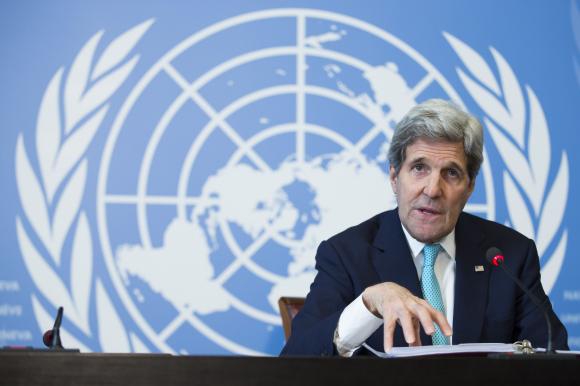 U.S. Secretary of State John Kerry gestures during a news conference after he delivered remarks to the United Nations Human Rights Council in Geneva March 2, 2015.
U.S. Secretary of State John Kerry gestures during a news conference after he delivered remarks to the United Nations Human Rights Council in Geneva March 2, 2015.CREDIT: REUTERS/EVAN VUCCI/POOL[/caption]
(Reuters) - U.S. Secretary of State John Kerry flies to Riyadh this week to reassure King Salman that any nuclear deal with�Iran�is in Saudi Arabia's interest, despite the country's fears it may boost its rival's support for Shi'ite Muslim interests in the region.
Convincing�Saudi Arabia�to accept any agreed nuclear deal is important to President Barack Obama�because he needs Riyadh to work closely with Washington on a host of regional policies and to maintain its role as a moderating influence in oil markets.
The main critics of the U.S. push for a nuclear deal are�Israel�and congressional Republicans. But�Saudi Arabia�is skeptical too that any agreement would only let�Irandevote more cash and energy to Shi'ite proxies in�Syria,�Iraq, Lebanon and�Yemen, escalating conflicts.
"The Saudis fear Obama will give the�Iranians a deal whatever the cost because it is important for his legacy, and that�Iran�will get a certain regional status in exchange for an agreement," said a diplomat in the Gulf.
Kerry met Iranian Foreign Minister Mohammad Javad Zarif in Montreux, Switzerland, on Monday at the start of up to three days of negotiations to try to meet a self-imposed deadline to achieve a framework agreement by the end of March.
He will then brief Saudi Arabia's new king on the talks, and meet other senior Gulf officials later in the week, in an attempt to convince them that a diplomatic solution to the long-festering crisis over Iran's atomic program is in that country's interest too.
Saudi's anxiety about an agreement has fueled a flurry of diplomacy in recent days to bolster unity among Sunni states in the Middle East in the face of shared threats includingIran, analysts say.
Washington shares Arab concerns about Iran's role, particularly in�Syria�and�Yemen�and through its ties to Lebanon's Hezbollah militia, a senior Obama administration official said, on condition of anonymity, but added that there was a "very substantial" U.S. military commitment to Gulf allies.
"What we need to do is have the appropriate strategies to counter any provocative and destabilizing behavior... it's going to depend on what can we do effectively in places likeSyria�and�Yemen," he said.
ANXIOUS
U.S. officials are unwilling however to outline what strategies might curb Iran's regional influence, and Washington's record in�Iraq,�Syria�and�Yemen�- where armed Iranian allies have since flourished - has caused�Saudi Arabia�great anxiety.
The country's trust in Washington during the�Iran�talks is also still recovering from the sudden move in late 2013 towards a nuclear deal, when Saudi officials were blindsided by the revelation of months of secret talks between the U.S. and�Iran.
"They are very, very nervous about the way we are moving forward," said a Western diplomat who tracks the issue closely and said Riyadh feared a "lose-lose situation" in whichIran�either gained an atomic weapon or was freed from sanctions.
Riyadh has long been worried about�Iran�gaining nuclear weapons capability, something that once led King Abdullah to ask Washington to "cut off the head of the snake" by strikingIran, diplomatic cables released by WikiLeaks showed.
But it now sees Iran's involvement in Arab countries, particularly its backing of Syrian President Bashar al-Assad, its support for Iraqi Shi'ite militias and its ties to the Houthi group that has seized control in northern�Yemen, as a more urgent problem.
A senior State Department official told Reuters: "Secretary Kerry will make clear we understand the concerns they have about the region's security, concerns that we also share."
Meanwhile, King Salman is working to forge a united front among Sunni states against what Riyadh sees as the dual threat from�Iran�and IS, analysts say.
Over the past week Salman has met the leaders of all Saudi Arabia's Gulf Arab neighbors, the king of Jordan and the presidents of�Egypt�and�Turkey, the two most populous and militarily powerful Sunni states in the region.
"The understanding is we will face a more aggressive�Iran�if they sign an agreement. All the restrictions on it will be lifted and it will be much stronger. This is an issue that needs some sort of unity," said Mustafa Alani, an Iraqi security analyst with ties to the kingdom's Interior Ministry.
By Reuters











